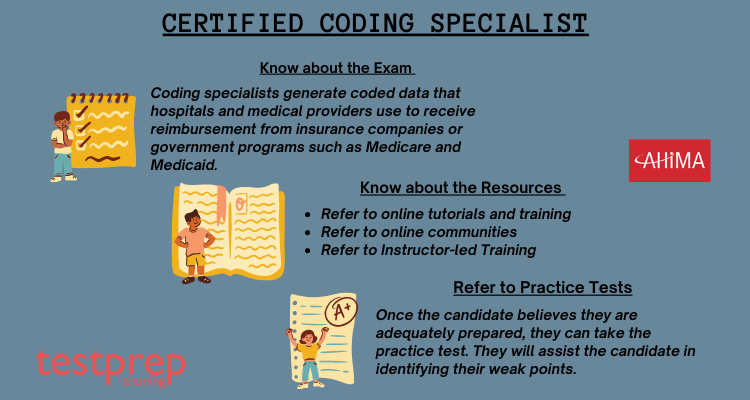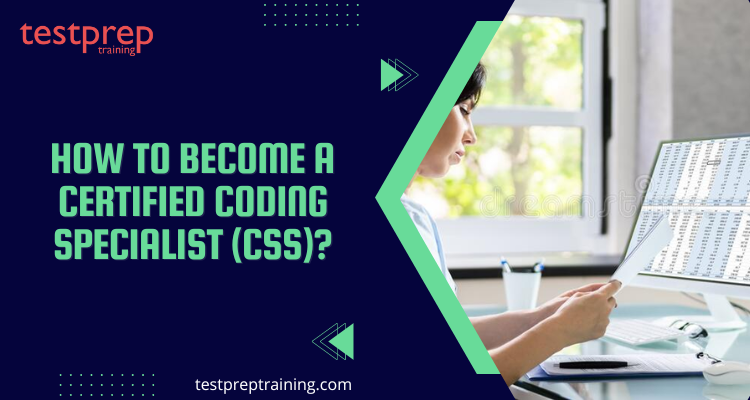Certified Coding specialists are experts at categorizing medical data from patient records, which they do frequently in hospitals as well as a variety of other healthcare settings. The CCS credential validates a practitioner’s demonstrated data quality and accuracy, as well as coding proficiency. Certified Coding Specialist (CCS) generate coded data that hospitals and medical providers use to receive reimbursement from insurance companies or government programs such as Medicare and Medicaid.
Let us now look at some of the important details about the Certified Coding Specialist exam and learning resources.
About Certified Coding Specialist (CCS) Exam
For professionals who have experience coding inpatient and outpatient records, the CCS certification is a logical next step. Coding specialists generate coded data that hospitals and medical providers use to receive reimbursement from insurance companies or government programs such as Medicare and Medicaid. Researchers and public health officials use this data to monitor patterns and test new interventions.
Who should take the Certified Coding Specialist (CCS) exam?
- Credentials held, education, and experience are all required to apply for the CCS exam. Candidates must put together one of the five eligibility claims listed below:
- Have the RHIA, RHIT, or CCS-P certifications;
- Complete courses in anatomy and physiology, pharmacology, pathophysiology, medical terminology, intermediate/advanced ICD diagnostic/procedural and CPT coding, and reimbursement methodology OR
- A minimum of two years of related coding experience straight applying codes is required.
- Possess the CCA credential as well as one year of direct coding experience.
- Possess a coding credential from another certifying organisation, as well as one year of direct coding experience.
Let us now move to the meat of the article –
How to become a Certified Coding Specialist?
Understanding internal and external strengths and weaknesses, as well as threats and opportunities, is a critical component of strategic planning. We should now discuss the important steps to becoming a Certified Coding Specialist.

Step 1 – Know in-depth about the exam syllabus
The Course Outline covers the descriptive details about the exam domains. Furthermore, These domains cover various subtopics. This is to help candidates prepare for the exam by identifying specific content within each topic that may be tested –
Domain 1 – Coding Knowledge and Skills (51.9%)
- Apply diagnosis and procedure codes based on provider’s documentation in the health
record - Determine principal/primary diagnosis and procedure
- Apply coding conventions/guidelines and regulatory guidance
- Apply CPT/HCPCS modifiers to outpatient procedures
- Sequence diagnoses and procedures
- Apply present on admission (POA) guidelines
- Address coding edits
- Assign reimbursement classifications
- Abstract pertinent data from health record
- Recognize major complication/co-morbidity (MCC) and complication and co-morbidity (CC)
Domain 2 – Coding Documentation (10.1%)
- Review health records to assign diagnosis and procedure codes for an encounter
- Review and address health record discrepancies
Domain 3 – Provider Queries (8.9%)
- Determine if a provider query is compliant
- Analyze current documentation to identify query opportunities
Domain 4 – Regulatory Compliance (29.1%)
- Ensure the integrity of health records
- also, Apply payer-specific guidelines
- furthermore, Recognize patient safety indicators (PSIs) and hospital-acquired conditions (HACs) based on
documentation - moreover, Ensure compliance with HIPAA guidelines
- additionally, Ensure adherence to AHIMA’s Standards of Ethical Coding
- also, Apply the Uniform Hospital Discharge Data Set (UHDDS)
Step 2 – Know about the Exam Format
Before embarking on your exam journey, you should have a basic understanding of the exam requirements. The four-hour Certified Coding Specialist (CCS) exam consists of multiple-choice questions. There are a total of 47 questions. The examination requires a passing score of 80% or higher. This exam will also cost you approximately USD 399. The exam, on the other hand, is divided into two sections: multiple-choice and medical scenario (inpatient, outpatient, and emergency department). Furthermore, the exam is administered via computer.
Step 3 – Know about – What’s in the Future?
There are some important points to be aware of when taking this exam, including the scope and future of the exam. It is critical to understand whether the exam objectives align with your goals or the specific purpose you wish to achieve. Medical coding is a high-demand profession with plenty of job opportunities. Medical coding is a good career choice because it provides job security, which is an important factor in determining one’s quality of life.
Step 4 – Refer to the Best Resources
The knowledge and comprehension levels of various resources vary. In academic life, however, revision should be done on a case-by-case basis. As a result, it is critical to match the type of revision you do on your source material. Here are some resources to assist you in your preparation:
Code Books – It is critical to use the correct codebook when studying. On test day, all candidates must bring the correct codebooks with them. Candidates who do not have the proper codebooks will be denied testing and their exam fees will be refunded. The International Classification of Diseases, Tenth Revision, Clinical Modification can be completed with the ICD-10-CM Code Book, 2020 as the primary reference.
Study Groups and Online tutorials – Interacting with people who share a common goal in life is essential. Participating in study groups is an excellent way to fully immerse yourself in the certification exam for which you applied. These groups will keep you informed of any recent changes or updates to the exam. Furthermore, both novices and professionals are present in these groups. Online tutorials broaden your knowledge and help you understand exam concepts thoroughly. They also discuss exam details and policies. As a result, learning with Online Tutorials will assist you in better preparing.
Practice tests – It is critical to put what you have learned into practice so that you can analyze your performance. You will be able to improve your answering skills by practicing, which will save you a lot of time. Furthermore, the best time to start doing practice tests is after you have finished one full topic, as this will serve as a revision supplement.
Step 5 – Take the exam in accordance with the Expert’s Advice
Sharp skills require a solid conceptual foundation. This exam will put you to the test in a variety of ways, but if you approach it correctly, you should be able to ace it in a single sitting! The first step toward passing any exam is to practice with the resources available. The American Health Information Management Association (AHIMA) hosts workshops and webinars to help you learn more about the Certified Coding Specialist (CCS) examination.





